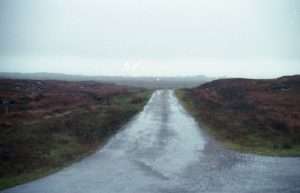Walking down the street, a nun approached from the other direction. Blue veil, jacket and skirt, perhaps it was a curl protruding from beneath her veil in the middle of her forehead that gave the sister a familiar look. “Good morning, sister, ” I said.
She nodded in greeting and I continued down the street. “Sister Brigid,” I thought, but it couldn’t be Sister Brigid. It is thirty-five years since I worked with Sister Brigid, six years since I last saw her. I stopped, what if it had been Sister Brigid? Turning around, the nun had gone around the corner and had disappeared from sight.
What if I had missed an important opportunity? What if my entire future turned out differently because of my failure to recognize the sister from the Sacred Heart of Jesus and Mary?
Fate sometimes hangs by the slimmest of threads; one person speaking out of turn, one encounter not taking place, and a whole different world might have been possible.
Sometimes, even stupid and irresponsible behaviour sets off a chain reaction that would otherwise not have occurred.
Had I not sat in a Glastonbury pub in May 1979 listening to Dire Straits playing Sultans of Swing on the jukebox, I might have been in class. Had I been in class, I might not have decided that people, whom I had ignored for the previous two years, were good company. Had I not spent time in the company I had chosen, I might have spent more time on books. Had I spent more time on books, I might have got the grades for Bristol University, from whom I had an offer of a place. Had I gone to Bristol, I would not have gone to London to attend the LSE. Had I not gone to the LSE, I would not have dropped out for a year. Had I not dropped out for a year, I would not have gone to work as a volunteer at a special school. Had I not gone to the school to work, I would not have met Sister Brigid and her fellow Irish nuns. Had I not met the nuns, I would not have come to Ireland.
And the rest falls into place . . .
Everyone’s life is similar, an accumulation of chances and random occurrences producing outcomes no-one expected.
Which explanation of events is true?
Stoppard’s,
Life is a gamble, at terrible odds-if it was a bet you wouldn’t take it.
or Shakespeare’s?
There’s a divinity that shapes our ends,
Rough-hew them how we will.
Faith suggests Shakespeare has got it right; free will means Stoppard has to be true.

